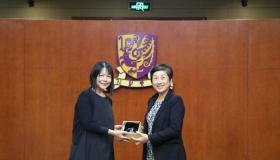【Master Forum】Nanogenerator for self-powered systems, IoTs, artificial intelligence and blue energy

Topic: Nanogenerator for self-powered systems, IoTs, artificial intelligence and blue energy
Speaker: Zhong Lin Wang
Date: July 20th, Friday
Time: 15:20-16:30pm
Venue: Room 103, Teaching Building D
Language: English
Abstract
Nanogenerators (NG) were first developed for self-powered systems based on piezoelectric effect and triboelectrification effect for converting tiny mechanical energy into electricity, which have applications in internet of things, environmental/infrastructural monitoring, medical science, environmental science and security.
The speaker will illustrate the networks based on triboelectric NGs for harvesting ocean water wave energy, for exploring its possibility as a sustainable large-scale power supply. In this lecture, you will learn more about NGs, which are self-powered sensors for actively detecting the static and dynamic processes arising from mechanical agitation using the voltage and current output signals.
Speaker Profile
As a moving force in the field of nanotechnology, Zhong Lin Wang is a foreign academician of the Chinese Academy of Sciences and a member of the European Academy of Sciences. He is the Hightower Chair in Materials Science and Engineering and Regents' Professor at Georgia Tech.He is the first top talent and team winner of the “Thousand Talents Plan” program of the Organization Department of the Central Committee of the CPC, and the chief scientist and founding director of the Beijing Institute of Nanoenergy and Nanosystems, Chinese Academy of Sciences.
Zhong Lin Wang has made original and significant contributions to the electron microscopy, in situ physical property measurement, and one-dimensional oxide nanomaterials, and their applications in energy, electronics, optoelectronics, and biotechnology.
He invented piezoelectric nanogenerators, friction nanogenerators, and first proposed the original concept of self-driven systems and blue energy, which has opened up new avenues for the development of micro-nano-systems, the Internet of Things, sensor networks, artificial intelligence and energy science for future. He coined the field of piezotronics and first discovered the piezo-phototronic effect, which is considered as a milestone in the development of nano-robots, human-electrical interfaces, nano-sensors, and LED technology.
Zhong Lin Wang ranks the first in the list of nanotechnology experts’ academic citations and influences published by Google Scholar in 2018. He has won many awards at home and abroad such as the Burton Medal of Microscopy Society of America in 1999, MRS Medal from Materials Research Society in 2011, China International Science and Technology Collaboration Award in 2013 and the Global Nanoenergy Prize in 2017, etc.




